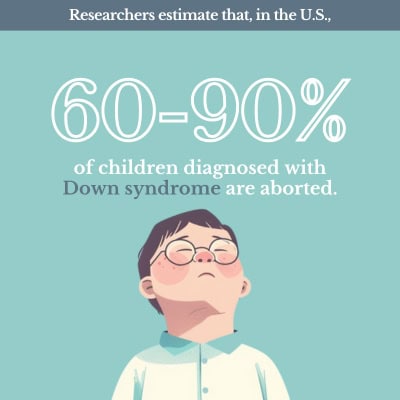Abortion ableism isn’t a phrase you’ll find college protesters lining the streets over. It’s not a phrase you’ll see defined in your Oxford Dictionary, and you probably won’t discover it while tumbling down a Wikipedia rabbit hole. The closest example of this phrase is a clean, charismatic, and sugar-coated synonym: selective termination.
Selective termination is more often associated with the termination of embryos after procedures like IVF. However, the term also encompasses a person’s ability to choose if their child is aborted based on whether or not that child has disabilities or special needs. In short, for a child with special needs, if their genetic code does not perform according to expectations, taking their life is considered justifiable.
Abortion and Ableism
If you know the history of the abortion industry in the USA, then it should come as no surprise that ableism is an accepted virtue of the abortion industry. It was Planned Parenthood’s founder, Margaret Sanger, who spearheaded the organization based on her passion for Eugenics. While Planned Parenthood has denounced Margaret Sanger, it’s proved difficult for the organization, and others like it, to abandon the corruption made popular by their foremother.

Terminating Individuals with Disabilities
In recent years, the world has become acquainted with abortion ableism through the practices of countries like Iceland. For those still unfamiliar with Iceland’s terrible abortion politics, news media paraded the country’s ability to “eradicate” Down syndrome. The catch was that they rid their population of the genetic condition by terminating nearly every preborn baby diagnosed with it. To make matters worse, this trend isn’t limited to Iceland. Researchers estimate that, in the U.S., 60 percent to 90 percent of children diagnosed with Down syndrome are aborted.
Imagine if this practice applied to any other demographic. Would we praise a country that tried to eradicate poverty by ending the lives of anyone below the poverty line? What about a government that abolishes racism by eradicating all racial minorities?
When put into perspective, this approach makes no sense. And it shouldn’t. Abortion ableism is fueled by misinformation and cruel assumptions about people with disabilities and special needs.
Ableism, Misinformation, and Misplaced Compassion
Where there’s abortion ableism, you’re bound to find misinformation and benevolent ableism. Spotting these two factors is easier said than done. After all, the evidence of ableism in the abortion industry is often well-disguised, wrapped in fear and assumptions that sound great but, in practice, are dehumanizing.
Misinformation
Misinformation significantly shapes how our world views those with disabilities. When exposed to inaccurate or biased information, people develop misconceptions, assuming individuals with disabilities are incapable, burdensome, or inherently unhappy. This leads to unfair judgments, exclusion, and underestimation. Additionally, misinformation results in inadequate support and resources, as policymakers may not understand how to advocate effectively.
Harmful stereotypes in popular media often perpetuate misinformation, but these stereotypes also appear in the medical community. As the study of disabilities evolves, practitioners may have outdated or incorrect information about certain conditions. As a result, they may be unequipped to tailor their approach to each patient and instead assume all patients with the same condition will face the same type or degree of struggle as they age.
Benevolent Ableism

Regarding abortion, a benevolent ableist believes that taking the life of a person with a disability is better than allowing that person to live. The idea that a person with a disability is better off aborted stems from the belief that abortion is a compassionate choice, sparing the person from a life of hardship, pain, or societal prejudice. The benevolent ableist assumes that because they wouldn’t want to live that kind of life, the person with that life doesn’t want to either. The personal preferences and fears of the ableist are projected onto the person with the disability, revoking them of their voice in the matter.
Falling prey to misinformation or benevolent ableism is easy. After all, no one can know everything about all disabilities, and compassion is an admirable quality. Knowing this, how do we go about dismantling abortion ableism effectively and with grace while generating the proper type of compassion toward those who could use our support?
Finding A Balanced Approach
I was fortunate to grow up with a younger cousin, Michael, who had verbal apraxia. The condition was so rarely discussed twenty years ago that people often mistook Michael for being Autistic or having Down syndrome. For most of his early life, he was non-verbal, only communicating with loud squeals, hitting, or pinching. His body was also compromised from the condition, requiring him to have leg braces. He also struggled with fine motor skills and comprehending schoolwork.
His case seemed to justify abortion ableism—a young child with a complex and misunderstood diagnosis. It was obvious that a long and difficult journey lay ahead of him with no guarantee that he would ever live a full and healthy life.
Thanks to his wonderful doctors, therapists, and parents, Michael learned how to speak, walk, and perform everyday tasks. He acquired a diploma from his high school and, with the help of his family, runs a successful craft business. But Michael’s success was no easy feat.
Even today, some people struggle when they first meet Michael. They’re usually unsure of his limitations or level of comprehension. As a result, some people are hesitant around him, often underestimating how much strength, skill, and joy Michael brings to the task at hand. Thankfully, with time, people’s perceptions of Michael changed. The more they seek to know him and give him room to be himself, the more they understand his disabilities and abilities.
Disabilities and Abilities
Finding the sweet spot between caring for someone with disabilities and underestimating them can be difficult. After all, no two people are exactly alike, even if they face similar challenges. Individuals with the same diagnosis exist on a spectrum of abilities, strengths, and weaknesses. While one person with Down syndrome may be nonverbal or be severely physically limited their entire lives, another person with the same condition may become a motivational speaker or a record-breaking swimmer.
If life with Michael has taught me anything, it’s that a person’s value doesn’t change over time. It’s our awareness of their value that changes. The more aware we become, the better equipped we are to advocate for them as fellow human beings.
How to Avoid Abortion Ableism
One of the best ways to avoid the pitfall of ableism is by engaging with and listening to those who speak on behalf of their communities. Thanks to social media, becoming more informed is just a few taps away. Great sources for finding advocates include platforms like TikTok, Instagram, and YouTube. By following or subscribing to the accounts of disability or special needs advocates, you help amplify their voices and support their efforts to advocate for others.
Moreover, many organizations, events, books, and seminars seek to educate the public on various disabilities, conditions, and the people who have them. Below are a few recommendations from each of these categories.
Platforms Combating Ableism
- Special Books for Special Kids — An empowering and interview-based YouTube channel hosted by a special education teacher.
- Makayla Noble — The Instagram of a cheerleader paralyzed in an accident when she was seventeen.
- Nick Vujicic — The Instagram of a human rights advocate, motivational speaker, and mountain-mover of a man, born without arms and legs.
See Life 2021
Focus on the Family’s See Life 2021 dedicated an entire episode to discussing this topic. The episode is titled It’s Going to Be Amazing and hosts several big names, including pro-life advocates Nick Vujicic and Trevor Hendershott.
Other Resources
Other great resources include books that introduce you to real or realistic characters with disabilities. Below are a few suggestions from the Focus on the Family Bookstore.
The Cure for Abortion Ableism
The key to ending abortion ableism is to seek to know every person you meet for the person they are not the person a diagnosis says they should be.
My cousin, Michael, will probably never write a New York Times best-seller. He’ll never host a talk show or speak in more than a few words at a time. Yet, for 28 years, we’ve had the privilege of witnessing God’s plan for Michael unfold. Here’s what we know so far:
Michael is the best person to celebrate a birthday with because he loves being around people and making them feel special. He’s an excellent helper, willing to tackle any chore, especially if it shows off his muscles. He’s an usher at his church, a loving big brother, a volunteer at the local youth center, a devoted SpongeBob fan, a wizard with a crochet needle, a pool shark, a prankster, an adventurer, an encourager, and so much more. Michael is full of surprises, both good and challenging, reflecting the richness of his humanity. He is, after all, as wonderfully human as the rest of us.
















